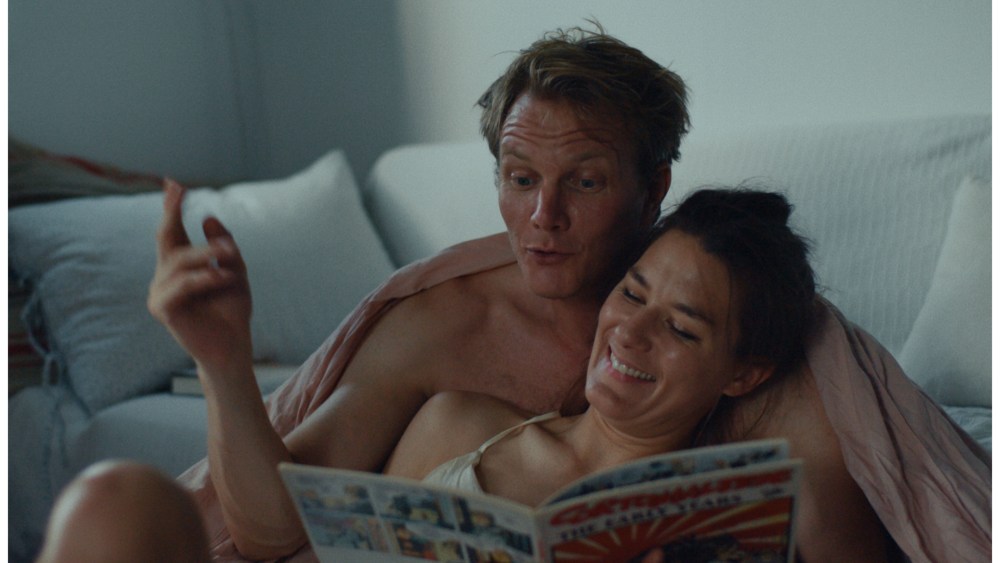A younger mom of two, harm by the breakdown of her first marriage, meets a form, good-looking, charismatic new man and learns to belief once more after a protracted however finally profitable romantic pursuit love. This might be the entire arc of many a well-liked romantic comedy or relationship drama. On “Loveable,” nevertheless, it solely takes up the opening couple of minutes, main us to the title card amid upbeat pop music and sun-kissed photographs. After which the story actually begins, with Norwegian writer-director Lea Ingolfsdottir telling an uncommon and sensible story a couple of marriage that wonders what occurs when a second probability passes by a primary. What occurred, and who was accountable. Nevertheless, even after that energetic, faltering introduction, the movie has some additional tonal shifts and narrative redirections.
Maria (Helga Guren) is compelled into painful self-reflection after her second husband Sigmund (Odegeire Thun) strikes away from her, and what initially looks like a worrying house life It become a extra in-depth private character examine. Did she push individuals away, or did others not meet her within the center? “Pretty” takes a consistently surprising method to characterization, risking the viewer’s sympathy for the sake of human fact – the title is heavy, even ironic.
Whereas the script typically veers into therapeutic language with robust emphasis, Guren’s emotionally courageous lead efficiency retains issues plausible and compelling. Premiering in competitors in Karlovy Differ, Ingolfsdottir’s characteristic debut ought to win over all followers of latest Norwegian hit The Worst Man within the World (alongside a protracted profession of shorts) The movie co-produced Thomas Robertson) however missed out on high-end artwork audiences.
When newly divorced Maria first sees good-looking musician Sigmund, she decides she desires him. He isn’t instantly smitten together with her, however finally succumbs to her quietly assured advances, and when she turns into pregnant, their heady affair results in marriage. Seven years later, nevertheless, issues didn’t go so easily. Maria, now a busy mom of 4, struggles together with her kindergarten-age son’s behavioral issues and her teenage daughter Alma (Maya Tosamer-Hruza), who’s hostile to her . Sigmund, as soon as the darling of his older kids and a doting father of two, was now absent for weeks at a time on work journeys – a results of Maria’s personal profession stagnation. (What precisely that is is a curious blind spot in Ingolfsdottir’s script.) After a very unhealthy day of poorly behaved kids and a declined bank card, when Sigmund returns from a latest journey When Zhong comes again in excessive spirits, you possibly can’t begrudge her letting off some steam.
Maria’s place is clearly sympathetic and might be acknowledged by many mother and father who expertise unequal distribution of childcare. Nevertheless, viewers could also be extra divided by the diatribe and outrage she brings to the couple’s argument, and it does not precisely cross gender strains, escalating even a low-stakes dispute about folding laundry into nuclear territory, and It exhibits that the couple’s marital issues could also be extra deeply rooted in character points. Sigmund, feeling more and more emptied by this fixed state of stress, advisable that she search anger administration remedy. She provides to attempt a separation as revenge, however instantly regrets it when he calls her bluff.
What follows is a reasonably forensic psychological examine, as they endure {couples} counseling with a affected person, insightful therapist (Heidi Jammondson Bloch) – solely to search out that The extra reserved and aloof Sigmund withdraws from the session altogether, leaving the nervous Maria to face the long-term drawback. Does she trigger battle or trigger battle? Will she search a associate to keep away from seeing herself? Off the sofa, a uncommon go to together with her mom (the gorgeous Elizabeth Sander) makes issues clearer, as they transfer from passive-aggressive nostalgia to bitter recriminations in a matter of minutes – for Maria A transparent blueprint of dysfunction unfolds.
There is a harsh, salty high quality to Ingolfsdottir’s writing in these scenes, and the movie’s most genuine confrontation leaves all events concerned – to not point out the viewers – feeling all of the extra exhausted. Within the more and more tenuous negotiations between Maria and Sigmund, nobody wins: we really feel equally her loneliness and his want for house and silence, whereas his implicit resistance to communication clashes together with her unfettered The emotional overflow may be simply as irritating. Thune does a superb job of portraying the unstated baggage beneath Sigmund’s swashbuckling exterior, however the movie is usually Guren’s showcase as she takes Maria from white-hot poisonous rage to desolate self-examination. In relation to cathartic crying, nothing is left behind.
It is a efficiency that is vivid and particular sufficient for instance the movie’s odd moments of pointless inner clarification: a very pat scene through which she repeats a self-help mantra within the lavatory mirror, replaying an argument in her head as she A jab is used as a substitute of a jab to specific a sense of “insecurity”, or to interrupt with a wierd perspective, a shot of a subway busker singing a sentimental model of Jacques Brel’s “Ne Me Quitte Pas” . “Cuteness” does not require such sentimental hand-holding; for a fierce, damaged heroine, studying to carry her personal hand is an operational problem.

